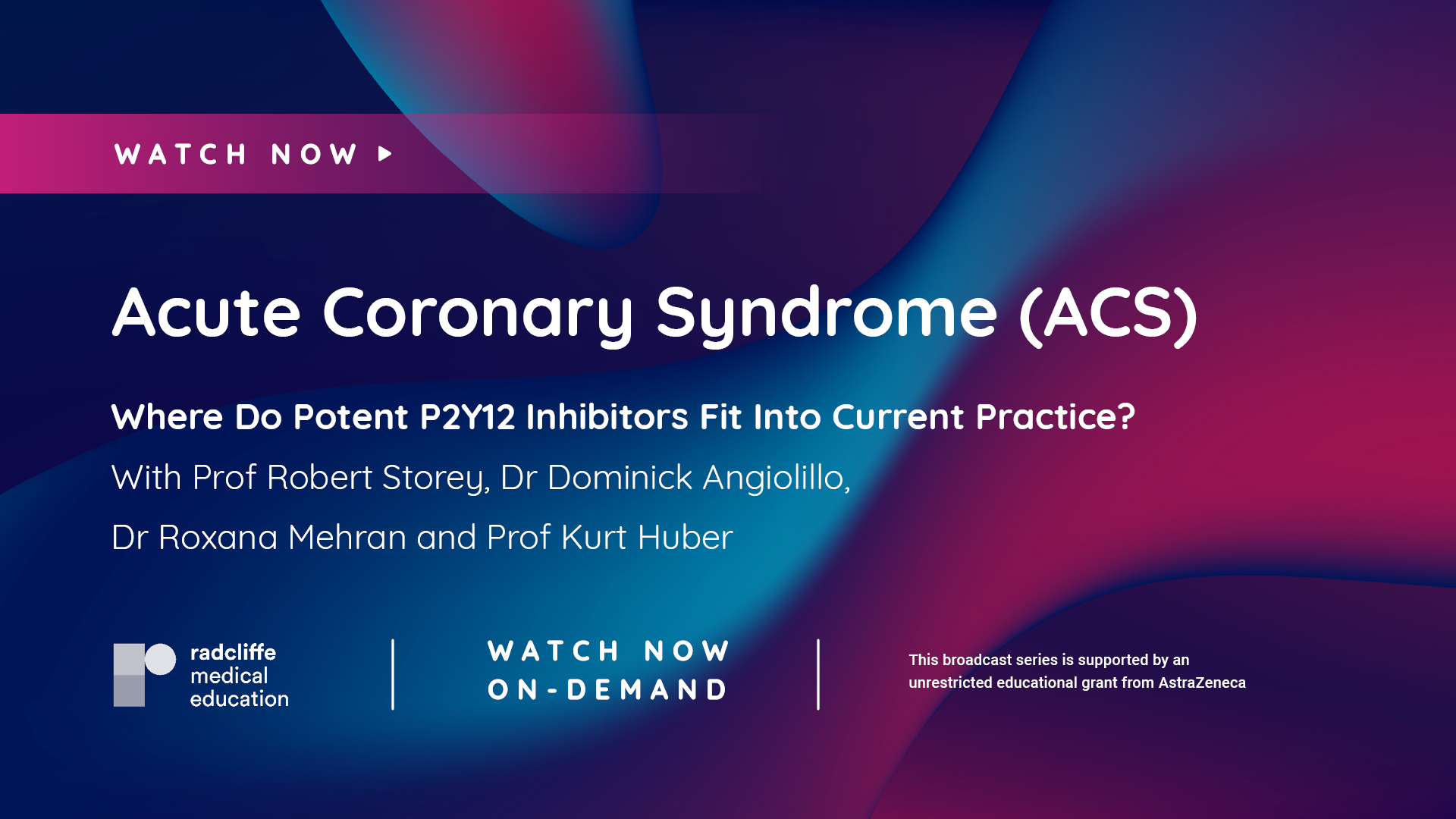Where Do Potent P2Y12 Inhibitors Fit Into Current Practice? - Acute Coronary Syndrome (ACS)
Published: 24 June 2022
-
Views:
 14457
14457
-
Likes:
 7
7
-
Views:
 14457
14457
-
Likes:
 7
7
-
 14m 55sPart 5 Medically Managed ACS
14m 55sPart 5 Medically Managed ACS
-
 18m 8sPart 6 Long-Term Management
18m 8sPart 6 Long-Term Management
-
 9m 31sPart 7 Q&A and Discussion
9m 31sPart 7 Q&A and Discussion
-
 14m 41sPart 1 Unmet Needs in ACS Dominick J Angiolillo, Robert F Storey, Roxana Mehran, Kurt Huber
14m 41sPart 1 Unmet Needs in ACS Dominick J Angiolillo, Robert F Storey, Roxana Mehran, Kurt Huber
-
 10m 49sPart 2 P2Y12 Inhibitors in ACS: The Journey So Far Kurt Huber
10m 49sPart 2 P2Y12 Inhibitors in ACS: The Journey So Far Kurt Huber
-
 21m 29sPart 3 Potent P2Y12 Inhibition Robert F Storey
21m 29sPart 3 Potent P2Y12 Inhibition Robert F Storey
Overview
This broadcast series 'Where Do Potent P2Y12 Inhibitors Fit Into Current Practice?' will reappraise potent P2Y12 inhibitors, as evidence accumulates to support their broader use. At this juncture, there is still some uncertainty around patient selection, initiation and long-term management.
The first broadcast in this series, focused on Acute Coronary Syndrome (ACS). In this on-demand version of the live broadcast, Radcliffe Medical Education brings together a global faculty of experts in the field to look at current guidance, the landmark data, gaps in evidence and seeks to provide practical guidance.
Prof Rob Storey (Sheffield University, UK) moderates proceedings, and is joined by Prof Roxana Mehran (Mount Sinai Hospital, US), Prof Dominick Angiolillo (University of Florida College of Medicine-Jacksonville, US) and Prof Kurt Huber (Clinic Ottakring, AT) for a series of insightful presentations and discussions.
Catch up now on the other broadcasts in this series:
Key Learning Objectives
- Recall current unmet needs in ACS
- Summarise current use of antiplatelet therapy in ACS according to guidelines
- Describe the mode of action of potent P2Y12 inhibitors
- Identify settings where a potent P2Y12 inhibitor should be used in favour of clopidogrel
- Summarise the results of head-to-head trials between clopidogrel and potent P2Y12 inhibitors
- Select appropriate assessment criteria for ischaemic risk and bleeding risk
- Identify patients in whom a medical therapy only approach could be used over invasive strategies
- Use antiplatelet therapy effectively and safely for long-term management of ACS
Target Audience
- General Cardiologists
- Interventional Cardiologists
- Nurses and any other allied HCPs
More from this programme
Part 1
Unmet Needs in ACS
| 1 session | |
| Unmet Needs in ACS | Watch now |
Part 2
P2Y12 Inhibitors in ACS: The Journey So Far
Part 3
Potent P2Y12 Inhibition
| 1 session | |
| Potent P2Y12 Inhibition | Watch now |
Part 4
Balancing Efficacy and Risk
| 1 session | |
| Balancing Efficacy and Risk | Watch now |
Part 5
Medically Managed ACS
| 1 session | |
| Medically Managed ACS | Watch now |
Part 6
Long-Term Management
| 1 session | |
| Long-Term Management | Watch now |
Part 7
Q&A and Discussion
| 1 session | |
| Q&A and Discussion | Watch now |
Faculty Biographies

Roxana Mehran
Professor of Medicine, Cardiology and Professor of Population Health Science and Policy
Roxana Mehran is Professor of Medicine, Cardiology and Professor of Population Health Science and Policy at the Icahn School of Medicine at Mount Sinai in New York. She is also Director of Interventional Cardiovascular Research and Clinical Trials at The Zena and Michael A Weiner Cardiovascular Institute at Mount Sinai Hospital where, over the past 5 years, she has led the development of a globally respected data and clinical coordination centre to support large, multicentre, multinational clinical trials designed to help improve outcomes and quality of life for patients undergoing interventional cardiovascular procedures. In recent years, her work has had a special emphasis on gaining a deeper understanding of anticoagulation and antiplatelet regimens post angioplasty and transcatheter valve replacement; and collection and interpretation of sex-specific data in cardiovascular clinical trials.
Roxana serves on editorial board of multiple peer reviewed journals, including …





